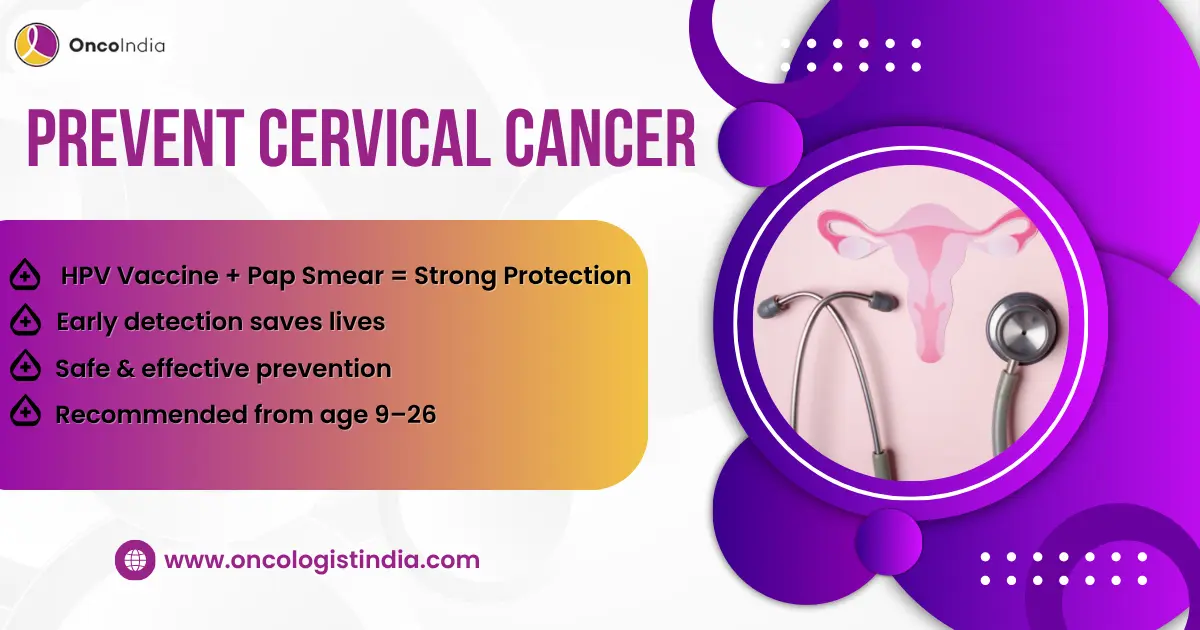Cervical cancer is the most commonly diagnosed cancer in women; each year, thousands of women are diagnosed with cervical cancer. The good news is that it is also highly preventable. Regular Pap smears and the HPV vaccine offer most women preventive options. Together, these methods can provide women with significant protection against cervical cancer. This blog will discuss what cervical cancer is, the role of HPV in cervical cancer, and why vaccinations and routine pap tests are necessary for reducing risk.

Cervical cancer begins in the cervix, the lower portion of the uterus that connects with the vagina. Usually, it starts with abnormal changes in the cervical cells. If these abnormal cells are not treated, they will continue to grow, and cancer will develop.
However, while some women have symptoms when diagnosed, many women are asymptomatic when diagnosed in early stages, which is why regular screening is important.
As stated by the World Health Organization, cervical cancer is the 4th most common cancer among women in the world. Thousands of new cases of incidence are diagnosed annually in India. These numbers demonstrate the importance of prevention.
Human Papillomavirus (HPV) is the main cause of cervical cancer; it is a virus that is very common and is transmitted by sexual contact. Most HPV infections go away on their own. However, certain types of HPV can persist in the body and can change the growth of cells in the cervix over time, leading to the formation of abnormal cells, which can eventually lead to cancer.
The best way to protect yourself from cervical cancer is to prevent the HPV infection in the first place. The HPV vaccine is an important aspect in accomplishing this.
The HPV vaccine is effective against the strains of HPV that most commonly cause cervical cancer. By properly preventing that infection, you reduce the chance of developing cervical cancer later.
Health authorities recommend that boys and girls aged 9 to 14 receive the HPV vaccine. The vaccine works best when it is delivered before an individual becomes sexually active. Women can get the vaccine until the age of 26, and some adults may get a vaccine until the age of 45 after consulting their doctor.
Evidence collected worldwide shows that the HPV vaccine is safe and effective to take. Additionally, the most common side effects of the vaccine are mild, including soreness at the injection site or low-grade fever.
A Pap smear, or Pap test, is the gentle collection of cells from the cervix to see if there are any abnormalities. The HPV vaccine can help prevent the virus, while Pap smears can detect abnormal changes in the cervix.
Identifying abnormal (precancerous) cells through Pap smears can help identify any signs of cancer. If immediate treatment is necessary, it can commonly cure abnormal Pap smears. Continuing to screen for preventative reasons can save lives.
The HPV vaccine and Pap smears work well together. The vaccine will prevent most HPV infections, while the Pap smear will detect any abnormal changes that may still occur.
By doing both, there is significant protection against cervical cancer. Countries that encourage vaccination and regular screening have seen significant decreases in cervical cancer rates.
The ideal time to vaccinate for HPV is at ages 9-14. Vaccination before sexual activity confers the best protection. Women can be vaccinated until age 26, as long as they have not been previously vaccinated.
Women should begin a Pap smear at age 21. Keep having pap smears regularly up until middle age, no matter your position on vaccination for HPV.
Each woman has a different experience, and risk factors are distinctive. Discuss with your doctor about the best schedule for vaccination and screening.
Because of false beliefs, many women avoid the vaccine or Pap exams. Let's clarify some of the false beliefs.
Myth: The HPV vaccination causes infertility.
Fact: Studies have found no correlation to infertility. The vaccine does protect against cervical cancer, which can impact fertility if untreated.
Myth: Only girls need to get the HPV vaccine.
Fact: Both males and females should pay for the vaccine. Males can transmit HPV and suffer from diseases associated with HPV.
Myth: The Pap exam is uncomfortable.
Fact: A Pap exam may cause a little discomfort, but it is not painful. The exam is quick and a safe test in a short process.
Myth: If you receive the HPV vaccine, you don't need Pap exams.
Fact: If you obtain the HPV vaccine, you still need to be screened for abnormally rare cells by a Pap exam.
Dr. Shivakumar Uppala is one of the leading oncologists in Bangalore for women who need expert care. He has years of experience treating and preventing cervical cancer, and he utilizes early detection, advanced treatments, and compassionate care.
Women can consult Dr. Uppala for HPV vaccinations, Pap smear screening, and full-range cancer care options in Bangalore.
Cervical cancer can be prevented. The HPV vaccine and regular Pap smears are two simple things you can do for your health. The vaccine protects against HPV, and Pap tests will identify changes at an early stage. Working together, these approaches can save lives. If you live in Bangalore, consider making an appointment for an HPV vaccine and Pap smear screening with Dr. Shivakumar Uppala. The best way to protect your health and your future is to get started today.